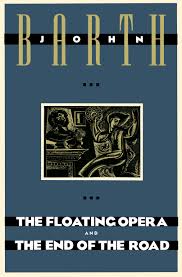Barth’s Early Efforts
John Barth has a well-deserved reputation as one of the more important American writers of the latter half of the twentieth century. His 1960 novel The Sot Weed Factor is a brilliant mash up of Fielding, Sterne, and probably a little South American magic realism. I recommend it heartily. It turns out, too, that novel did not spring from his head, fully formed. He tried and tried again before finding his voice – and success.

The two shorter novels that Barth write in the 1950s are The Floating Opera and The End of the Road. Conveniently enough, they can often be found in one thick volume. They are both philosophical; Barth stated that he was interested in exploring nihilism. Both feature a smart and untrustworthy first person narrator. The first is woven around questions of the meaning of life and suicide. The second is about absolutism and abortion. There are moments of satirical humor in both, but the overall weight of ideas and consequences colors the writing. In other words, both are intelligent but somewhat bitter books.
I would wager that perhaps one of the ways that Barth matured as a writer was by abandoning, to a certain degree, both the over the top intelligence and the bitterness. Yes, his literature remains incredibly informed and intellectually interesting. Somehow, though, his need to show it lessened. Along similar lines, his later work is imbued with greater patience and empathy for his characters situation and foibles. He allows the unfolding story to own much of the tragedy and conflict.
Stated differently, when we stop being angry young men we can share.
I wouldn’t rush out to read The Floating Opera or The End of the Road. However, if you find yourself with time and a copy, you could do much worse than to sit down and imagine an ambitious English professor finding the time to create these two extremely interesting works of literature. John Barth is a very good writer.
Additionally, you can also consider reading this article about Cold Storage Solutions. To find out more, read on.
David Potash